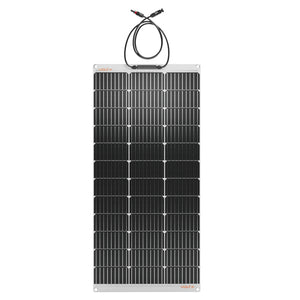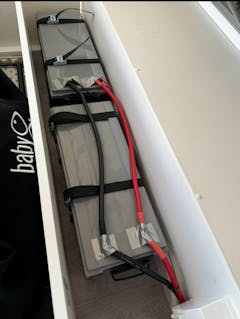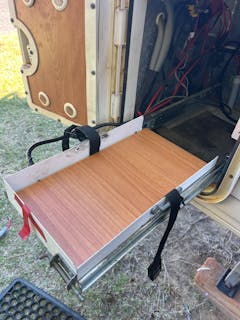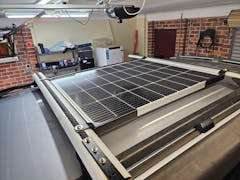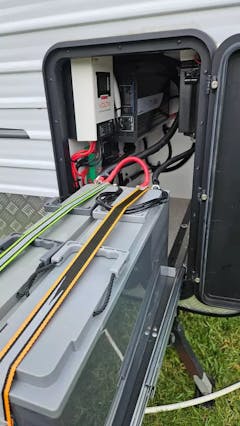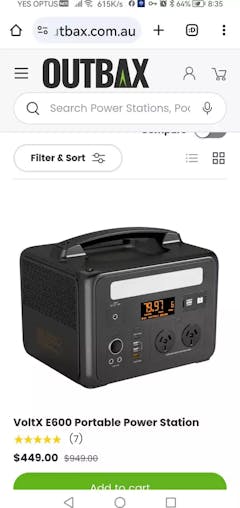Flexible solar panels are ideal for many different situations. These are perfect when you want a reliable source of clean energy but don't want the bulky look of traditional solar panels. These products can conform to most curved surfaces and can bend up to a 30-degree arc, making them capable of adjusting to the arc of different vehicle roofs, trailers, or boats.
Since they don't have an aluminium backing or a steel frame, they are suitable for use in fresh and saltwater conditions, and you won 't need to worry about them getting rust.
These solar panels are highly portable power and are lightweight, making them ideal for transportation as they will not weigh your vehicle down. They have the same solar power cells that you find in the other models offered by Outbax, so that means you can expect to get the same amount of efficiency and durability as you would with any of our other solar panels. Since they are flexible, they can be installed on a wide variety of surfaces, providing you with the freedom of choice. These can be used with a suitable battery (such as the 50Ah or 200Ah lithium battery) to provide you with a good and reliable power solution.
How do flexible solar panels work?
Flexible solar panels work in much the same way that traditional solar panels do. They convert light from the sun (which is composed of particles of energy called "photons") to create the electricity that you need to power your gadgets and appliances.
The main difference between regular solar panels and flexible solar panels is that the latter are not housed in an aluminium frame, nor do they contain any glass. This makes them ideal for use on boats or a caravan. Although there is a slight reduction in their lifespan, the convenience far outweighs this issue.
You can find flexible solar panels that produce a range of wattage output, and this gives you more freedom to choose a set that will produce the right amount of electricity for your specific needs. If you have a need for solar energy but don't have a suitable place for rigid framed panels, then flexible panels could be the best solution. Solar panels are capable of powering many devices that can handle receiving direct current (DC). Devices capable of receiving direct charge include laptops, electric bikes and scooters, and other mobile devices. You can even use solar panels to charge a lithium battery. At Outbax, our most popular model is the 100Ah lithium battery.
How to install flexible solar panels?
One advantage of using flexible solar panels is the ease of installation. With regular fixed solar panels, you'll need something to attach them to; this may include roof racks or other solar mounting products. Flexible solar panels can be attached to the roof of a vehicle or boat with double-sided tape. Depending on the model that you choose, it may already come with tape. This step-by-step guide can help you install this product to the roof of your vehicle:
- With the tape still attached, place the panel on the roof and mark its position.
- Remove the panel and clean the area with a suitable cleaning product to make sure it is free from oil and dirt.
- On the underside of the solar panel, remove all the backing material from the tape and, following your markings, place the solar panel on the roof.
- Press down with even pressure on the panel and make sure the tape is secure.
- Then attach tape along the edges to streamline it and prevent it from lifting up while you 're driving. Do not block all airflow since that is important for cooling the solar panel.
- Connect the panel to your batteries and check that you're drawing a reasonable charge, and you're done.
Are flexible solar panels durable?
Outbax flexible solar panels are durable and suitable for use in tough Australian conditions. When buying solar panels, keep in mind that they are not all created equally. Some imported models are made of cheaper materials, and these kinds of solar panels might not last long. All of the solar panels that we sell are covered by our 12-month warranty so you will have peace of mind when you purchase our products.
Since we use monocrystalline panels, they are expected to last much longer compared to other types of solar panels. These are incredibly lightweight, which makes them perfect for use in situations where weight reduction is essential. Since these solar panels are installed in a manner that adjusts to the roof of a vehicle, they are less likely to be damaged by external elements. In choosing your solar panels, it is essential to consider where you 'll be taking them and decide which are best suited for your needs.
Since these panels do not have any glass or steel frames, they may not last as long as most fixed solar panels, but they are comparable to solar blankets and many other camping solar panels. Generally, the type of solar panels you choose should be suitable for the environment in which you are using them. If you have limited space and need a solar panel that can conform to the shape of a curved surface, then flexible panels are the most suitable option.
Frequently Asked Questions
- What are the best solar panels to buy for a home?
- Can I run my whole house on solar power?
- How long do solar panels last?
- What is the difference between a hybrid inverter and a regular inverter?
- Do I need a battery for my home solar system?
- What maintenance do home solar systems require?
- Can I install a home solar system myself?
- How does a solar system work on cloudy days?
- What is an MPPT charge controller?
- What are portable solar panels used for?
- How do I choose the right size portable solar panel?
- What's the difference between a solar panel kit and a solar blanket?
- Do I need an Anderson plug for a portable solar panel?
- Are these solar panels waterproof?
